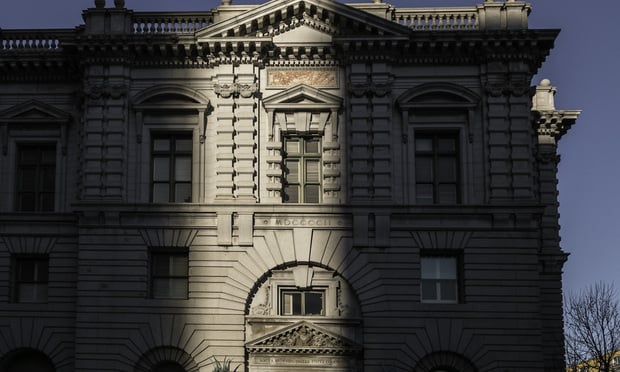3 Things to Watch For at Potentially Contentious 9th Circuit Confirmation Hearing
Ryan Bounds, an assistant U.S. attorney from Oregon, has been nominated for the Ninth Circuit bench by President Donald Trump despite the fact his home-state senators oppose him.
May 08, 2018 at 06:21 PM
5 minute read
 U.S. Court of Appeals for the Ninth Circuit. Photo: Jason Doiy/ALM
U.S. Court of Appeals for the Ninth Circuit. Photo: Jason Doiy/ALM The Senate Judiciary Committee is set for what is bound to be a intriguing session Wednesday morning as it holds a confirmation hearing on the Ninth Circuit nomination of Ryan Bounds, a federal prosecutor from Oregon.
When Bounds was put forward by President Donald Trump last year, Oregon's two Democratic U.S. senators—Ron Wyden and Jeff Merkley—initially said they would refuse to sign off on his nomination since he was not vetted through their bipartisan selection committee. In February, the senators included his name on a list of four candidates their committee had ranked the highest to White House Counsel Donald McGahn. But after opinion pieces Bounds wrote while an undergraduate at Stanford University surfaced in which he criticized “race-focused” student groups, among others, Wyden and Merkley urged the White House not to move forward with his nomination.
On Monday, the Oregon senators criticized Sen. Charles Grassley, R-Iowa, the chairman of the Senate Judiciary, for moving ahead on Bounds' Ninth Circuit bid despite their objections. Here's what to watch for in what could be an eventful morning.
1. Will talk of the blue slip process dominate the day?
 Ryan Bounds, an assistant U.S. attorney in Portland.
Ryan Bounds, an assistant U.S. attorney in Portland.Even though the morning's hearing is nominally about Bounds, there's a good chance the Senate's so-called blue slip process will be front and center. The process, which operates under tradition but isn't codified by statute, allows senators to return a form—an actual blue slip of paper—indicating that they've signed off on a particular nominee.
Although the nonpartisan Congressional Research Service indicates that only two Sentate Judiciary chairmen—Sens. Patrick Leahy, D-Vermont, and James Eastland, D-Mississippi—have required two blue slips from home state senators to move forward with nominations, the service also has no record of a Democratic chair moving forward with a hearing on a nominee for whom a Republican colleague refused to return a blue slip.
Grassley, for his part, indicated in a speech on the Senate floor in November that he intends to abide by the blue slip process for district court seats, but that he would “not let Senators abuse the blue slip to block qualified nominees for political or ideological reasons.”
Ninth Circuit watcher Arthur Hellman, a law professor at the University of Pittsburgh, said that in this instance, Republican senators will likely point to the fact Bounds' name was put forward by the Oregon senators' own committee. “They'll ask, 'How can you withhold the blue slip and how can you say it wasn't a consultation process when your own committee put forward the name?'” said Hellman.
2. Just how much will senators dig into Bounds' undergraduate writings?
Liberal advocacy group Alliance for Justice issued a report in February highlighting opinion pieces Bounds wrote for a student newspaper at Stanford that criticized multiculturalism, urged the school to adopt a “beyond a reasonable doubt” approach to campus sexual assault, and used a cartoon Indian caricature to illustrate its recurring “Smoke Signals” feature.
Bounds, who at the time of the report chaired the Multnomah Bar Association's equity, diversity and inclusion committee, wrote an email to committee members apologizing for his “misguided sentiments,” according to the Oregonian. Bounds later stepped down from the position.
While some commentators have questioned whether a judicial candidate's undergraduate musings should be fodder for confirmation fights, Bounds' writings will almost inevitably come up Wednesday. His home state senators, after all, have accused him of failing “to disclose inflammatory writings revealing his archaic and alarming views about sexual assault, the rights of workers, people of color, and the LGBTQ community.”
“That lack of honesty made Mr. Bounds an unsuitable nominee for a lifetime appointment to the bench,” they said in Monday's joint statement.
3. What will all this mean for the other 'blue state' Ninth Circuit seats?
With seven current openings on the Ninth Circuit and another seat set to come open when Judge N. Randy Smith takes senior status later this year, Trump has the potential to reshape the makeup of the Ninth Circuit, a court he's frequently criticized. But so far, Trump has put forward only Bounds and former Hawaii Attorney General Mark Bennett.
Bennett, who had the backing of his two home-state Democratic senators, largely breezed through his confirmation hearing last month. The remaining openings also include four seats from states with entirely Democratic senate delegations—three in California and one in Washington. Will the process for nominees for the Washington and California seats more closely resemble Bennett's experience or Bounds'?
One possible clue: Sen. Dianne Feinstein of California, the ranking Democrat on the judiciary committee, took to Twitter Monday to echo her displeasure with how Grassley moved forward with the Bounds nomination.
I strongly oppose Chairman Grassley moving forward with a judicial nominee who does not have sign off from @RonWyden or @SenJeffMerkley. This has never happened in the modern history of the Senate. Republicans are going to unprecedented lengths to stack our courts. #CourtsMatter
— Sen Dianne Feinstein (@SenFeinstein) May 4, 2018
“I think the president and his advisors are going to be looking at that very, very closely,” said Hellman. “If they have to pull out every stop to get Bounds confirmed, they're going to be very cautious.”
This content has been archived. It is available through our partners, LexisNexis® and Bloomberg Law.
To view this content, please continue to their sites.
Not a Lexis Subscriber?
Subscribe Now
Not a Bloomberg Law Subscriber?
Subscribe Now
NOT FOR REPRINT
© 2025 ALM Global, LLC, All Rights Reserved. Request academic re-use from www.copyright.com. All other uses, submit a request to [email protected]. For more information visit Asset & Logo Licensing.
You Might Like
View All
White & Case KOs Claims Against Voltage LLC in Solar Companies' Trade Dispute

Goodwin Procter Relocates to Renewable-Powered Office in San Francisco’s Financial District

Polsinelli Picks Up Corporate Health Care Partner From Greenberg Traurig in LA

Perkins Coie Lures Former Longtime Wilson Sonsini Tech Transactions Partner
Trending Stories
Who Got The Work
J. Brugh Lower of Gibbons has entered an appearance for industrial equipment supplier Devco Corporation in a pending trademark infringement lawsuit. The suit, accusing the defendant of selling knock-off Graco products, was filed Dec. 18 in New Jersey District Court by Rivkin Radler on behalf of Graco Inc. and Graco Minnesota. The case, assigned to U.S. District Judge Zahid N. Quraishi, is 3:24-cv-11294, Graco Inc. et al v. Devco Corporation.
Who Got The Work
Rebecca Maller-Stein and Kent A. Yalowitz of Arnold & Porter Kaye Scholer have entered their appearances for Hanaco Venture Capital and its executives, Lior Prosor and David Frankel, in a pending securities lawsuit. The action, filed on Dec. 24 in New York Southern District Court by Zell, Aron & Co. on behalf of Goldeneye Advisors, accuses the defendants of negligently and fraudulently managing the plaintiff's $1 million investment. The case, assigned to U.S. District Judge Vernon S. Broderick, is 1:24-cv-09918, Goldeneye Advisors, LLC v. Hanaco Venture Capital, Ltd. et al.
Who Got The Work
Attorneys from A&O Shearman has stepped in as defense counsel for Toronto-Dominion Bank and other defendants in a pending securities class action. The suit, filed Dec. 11 in New York Southern District Court by Bleichmar Fonti & Auld, accuses the defendants of concealing the bank's 'pervasive' deficiencies in regards to its compliance with the Bank Secrecy Act and the quality of its anti-money laundering controls. The case, assigned to U.S. District Judge Arun Subramanian, is 1:24-cv-09445, Gonzalez v. The Toronto-Dominion Bank et al.
Who Got The Work
Crown Castle International, a Pennsylvania company providing shared communications infrastructure, has turned to Luke D. Wolf of Gordon Rees Scully Mansukhani to fend off a pending breach-of-contract lawsuit. The court action, filed Nov. 25 in Michigan Eastern District Court by Hooper Hathaway PC on behalf of The Town Residences LLC, accuses Crown Castle of failing to transfer approximately $30,000 in utility payments from T-Mobile in breach of a roof-top lease and assignment agreement. The case, assigned to U.S. District Judge Susan K. Declercq, is 2:24-cv-13131, The Town Residences LLC v. T-Mobile US, Inc. et al.
Who Got The Work
Wilfred P. Coronato and Daniel M. Schwartz of McCarter & English have stepped in as defense counsel to Electrolux Home Products Inc. in a pending product liability lawsuit. The court action, filed Nov. 26 in New York Eastern District Court by Poulos Lopiccolo PC and Nagel Rice LLP on behalf of David Stern, alleges that the defendant's refrigerators’ drawers and shelving repeatedly break and fall apart within months after purchase. The case, assigned to U.S. District Judge Joan M. Azrack, is 2:24-cv-08204, Stern v. Electrolux Home Products, Inc.
Featured Firms
Law Offices of Gary Martin Hays & Associates, P.C.
(470) 294-1674
Law Offices of Mark E. Salomone
(857) 444-6468
Smith & Hassler
(713) 739-1250






